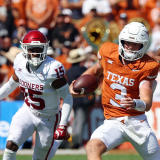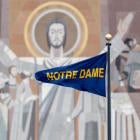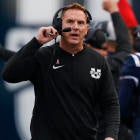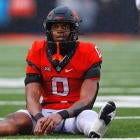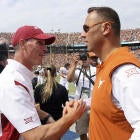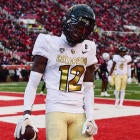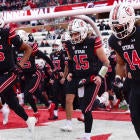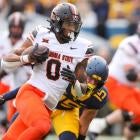The NCAA just lost Notre Dame.
Not as a member -- not yet, at least -- but as a philosophical partner in the college mission. That was significant and obvious Tuesday. The school was turned down by the NCAA in its appeal of academic fraud penalties applied in November 2016. But that's almost secondary.
Notre Dame president Reverend John I. Jenkins reacted to the decision by calling the NCAA process "perverted." That alone is some of the most strident language ever used by such a respected high-profile administrator against the association, let alone coming from a man of the cloth.
But there is other choice language in the letter to "members of the Notre Dame family" that apparently also included the national media.
Jenkins criticizes that "rational explanations are lacking" in vacating Notre Dame's wins in 2012 and 2013. He called the NCAA's conclusion "a dangerous precedent [that] turns the seminal concept of academic autonomy on its head."
Where have we heard something like that lately? Yup, in the letter where Jenkins basically points out the inequality of North Carolina skating on the mother of all academic fraud cases in October.
What Jenkins didn't have to say out loud is, if the NCAA doesn't clean up its arbitrary decisions on such issues, Notre Dame has options. The NCAA needs the Irish more than they need the NCAA.
The threat doesn't have be spoken. It is implied. Notre Dame gives that college mission legitimacy because there are few better at mixing academic integrity with athletic excellence. There would be no BCS or College Football Playoff had Jenkins and his predecessors not agreed it was good for Notre Dame.
The Irish broke away from the College Football Association to sign with their own network (NBC) in 1991. At the time, that was a momentous move. Notre Dame's power and influence hasn't diminished much since then.
Jenkins' letter was a reminder that the school still carries quite a shillelagh. With so much money in the system, there has been vague talk for years about the top tier of universities breaking away from NCAA and keeping everything for themselves.
Tuesday's decision does nothing to tamp down that talk. Athletic departments long ago became giant profit-driven corporate giants. You don't mess with that kind of brand and power with arbitrary infractions committee decisions made behind closed doors by professors better qualified at teaching chemistry than interpreting the NCAA rule book.
The case involves two players who the NCAA says competed while ineligible due to academic help from a trainer. But all of it begs the question: What exactly is academic fraud?
Jenkins' letter basically questions whether the NCAA should even be in the business of answering that query. There is conga line of powerful administrators lining up behind him.
The NCAA basically does a great job at staging a heck of a basketball tournament. It's OK at overseeing play and practice rules. Everything else is a morass of trying to legislate morality and possible overreach debated each time something like this happens.
"The NCAA is not … an academic association with general responsibility for academic integrity at America's colleges and universities," Jenkins said.
That's weird … North Carolina asserted the same thing. The Tar Heels walked. The Irish are livid.
Jenkins, one of the most respected figures in education and athletics, also wrote, "The NCAA has not chosen to ignore academic autonomy, it has instead perverted it …"
Wow. You can almost hear the walls crumbling around the NCAA. If Notre Dame is questioning the association's oversight of one of the central tenets of the association -- academic integrity -- why shouldn't every school?
Sure, some of the Notre Dame response is self-serving. Without the vacation of wins, the Irish are still second to Michigan in all-time victories. With the penalty, ND is sixth.
To a majority of schools, a vacation of wins is nothing more than a paper penalty. At Notre Dame? The case drilled to the core of the school's integrity.
Read between the lines of Jenkins' sharply worded three-page message.
You don't move the goalposts on every infractions case, especially with Touchdown Jesus watching.


